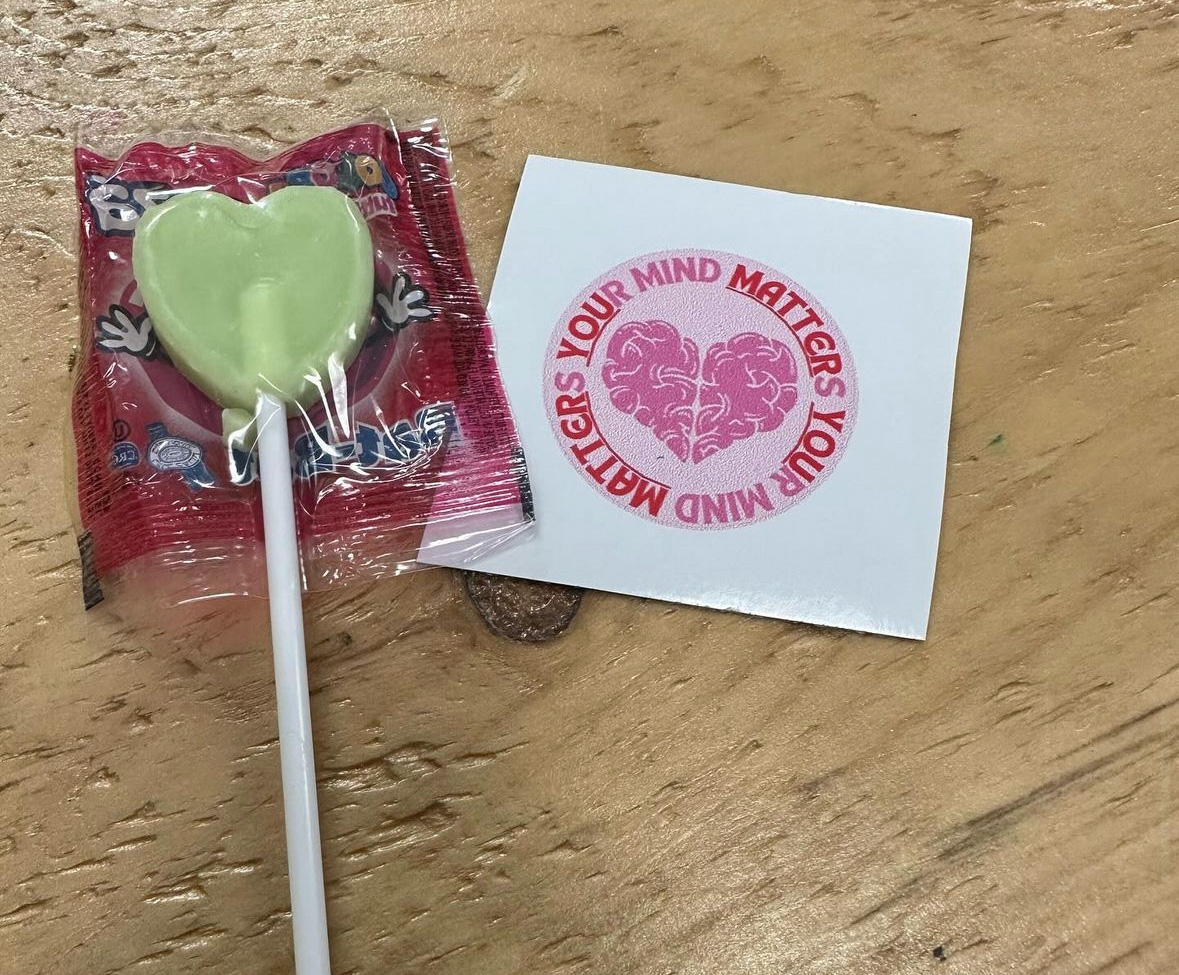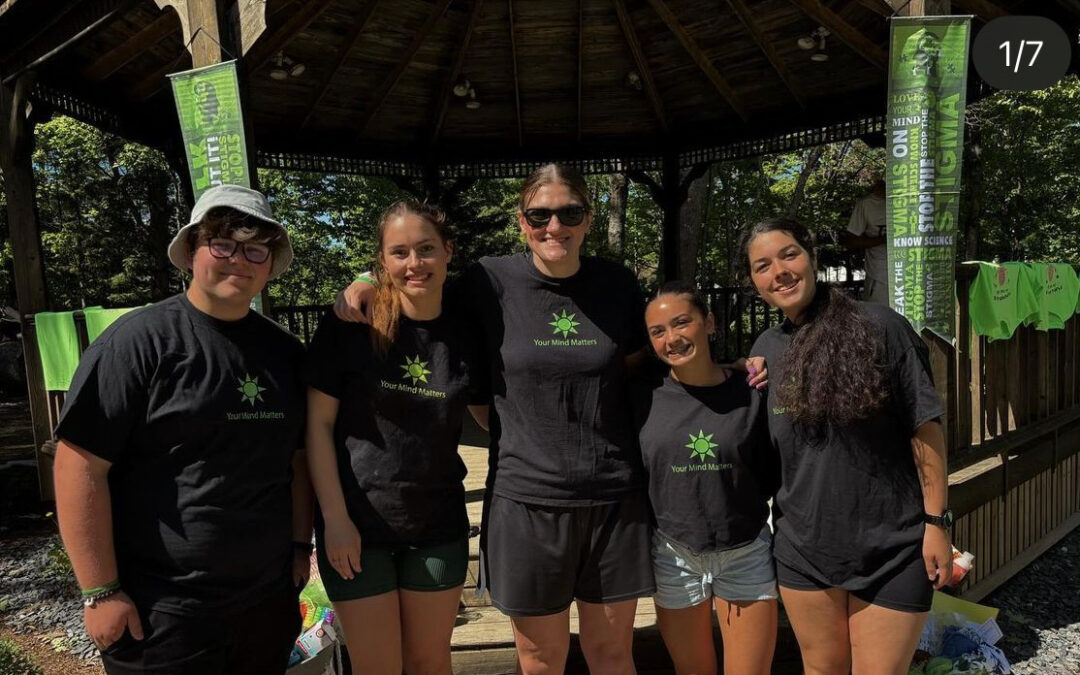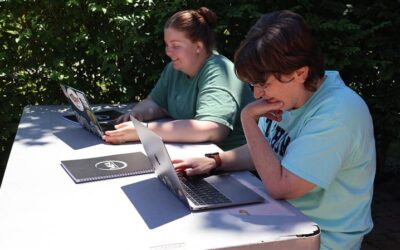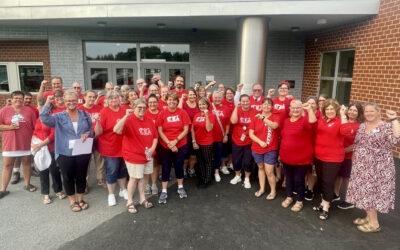Small Group, Big Impact
How students at Skowhegan Area High School are leading the charge to break down stigma surrounding mental health in their community.
It started as a safe space for students to talk peer-to-peer about their mental health struggles. It has since morphed into a powerful force for change and awareness.
Kaley brown
Skowhegan area high school teacher
When a group of three students approached Kaley Brown, teacher at Skowhegan Area High School, three years ago, seeking a space to discuss their mental health, little did they know they were sparking a community-wide movement. The group, Your Mind Matters, which started as a small gathering of peers supporting one another, has evolved into a dynamic, student-led initiative, dedicated to breaking down the stigma surrounding mental health at Skowhegan Area High School.
“It started as a safe space for students to talk peer-to-peer about their mental health struggles,” Brown explained. “It has since morphed into a powerful force for change and awareness.”
This group has become an opportunity for students to discuss mental health concerns and share positive messages with the school and community. Your Mind Matters collaborates with other Skowhegan Area High School and community groups to create murals, host drives, invite speakers, organize family-friendly activities, and spread awareness about important mental health themes throughout the year.

Breaking Down Stigma, One Conversation at a Time
At its core, Your Mind Matters, Brown emphasized, is student-led, which is part of what makes it so special. “It’s important to me that the students lead the group because students are more likely to listen to and connect with their peers.”
The group—which has grown to around six members—meets weekly in Brown’s classroom to focus on raising awareness of mental health and some of the perceived barriers people face when addressing their mental health.
“We want to break down the stigma and raise awareness of different mental health issues,” one student shared. “We want to create a supportive environment to talk about mental health, so that our peers know they are not alone.”
“Mental health struggles impact everyone,” one of Brown’s students said. “It is important to me because it has impacted me, and it is disheartening to hear people make assumptions. This group works to advocate for others, because we are all impacted.”
The Your Mind Matters students are highlighting an issue that national and statewide statistics support. According to NAMI Maine, 1 in 6 school-age youth in the United States experience a mental health disorder each year, and 14,000 Mainers age 12–17 have depression.
1 in 6 | 14,000
School-age youth in the us experience a mental health disorder each year, and 14,000 Mainers age 12-17 have depression
Other students chose to get involved with the group because they have seen their own family members struggle and not receive the help they needed—in part because of stigma and in part because mental health providers can be difficult to access in rural areas like Somerset County, where students from Skowhegan Area High School live.
“My family suffered from mental health challenges and didn’t get the help that they needed, so it hits close to home for me,” one student said. “Since members of my family weren’t able to get the help, I am hoping other people will.”
According to this year’s Maine Shared Community Health Needs Assessment, access to care is a challenge in Somerset County. The ratio of population to psychiatrists in Somerset County is nearly 200,000 to 1. This problem persists across the state. According to NAMI Maine, 260,862 people in Maine live in a community that does not have enough mental health professionals to satisfy the need.

Taking action, making a difference
Each month, students in Your Mind Matters select a mental health topic to raise awareness about. They’ve organized various initiatives, from suicide prevention campaigns to food drives, and have even partnered with local organizations to raise funds for mental health services—expanding their reach beyond the school walls.
In November, students worked to raise money for the district’s backpack program, which is administered through the food pantry located at the high school. “We chose to support the backpack program because we know that food insecurity can significantly impact mental health,” explained a Your Mind Matters member. “By addressing these underlying issues, we can create a healthier and happier school community.”
In the past, the group also organized a suicide awareness campaign—placing posters throughout the school and planting a garden of tulips as part of the Yellow Tulip Project. They have also hosted speakers, organized workshops, distributed stickers on Valentine’s Day, and circulated pamphlets to helplines and resources.
The group has gained community recognition. Last year, they were chosen as beneficiaries of a 5K hosted by local business Holland Variety Drug. This event raised over $1,000, which Your Mind Matters used to support their November fundraiser. Additionally, the group was honored by Somerset Public Health with a New Balance Move More Kids Award.
What does the future hold?
As Your Mind Matters continues to grow as a group, they have ambitious goals for the future. “We want to collaborate with other schools in our district and inspire them to start similar initiatives,” one student said. “We also want to focus on specific mental health issues like eating disorders, which can be particularly challenging for young people.”
In February, they say they plan to focus on an eating disorder campaign—something that has directly impacted a few members. “We want to talk and raise awareness for others, so that students know that they are not alone,” one group member explained.
They also would love to recruit more diversity to their group. “I think if we had at least one person who was a male student, more male students would be encouraged to join, it would really help.”
By empowering students to take ownership of their mental health, Your Mind Matters is making a significant difference in the lives of countless young people. Through these efforts, these students aim to foster a community of positivity and kindness, smashing the stigma associated with mental health struggles in their community.

Resources to help your students and community
→Youth Mental Health First Aid:
Designed for adults that work with youth ages 12-18. This training provides information on common mental health challenges in youth, skills for holding supportive conversations and connecting youth to appropriate professional care, and local and national resources for additional support.
→Teen Mental Health First Aid:
Teen Mental Health First Aid teaches high school students how to identify, understand, and respond to signs of mental health or substance use challenges among their friends and peers. The training helps students develop the skills to have supportive conversations with their friends and then connect with a trusted adult.
→Find NAMI programming and upcoming training:
namimaine.org/youth-ed-resources/
→NAMI Maine’s Teen Text Support Line:
Text (207)525-8398 or visit namimaine.org/teentextline







